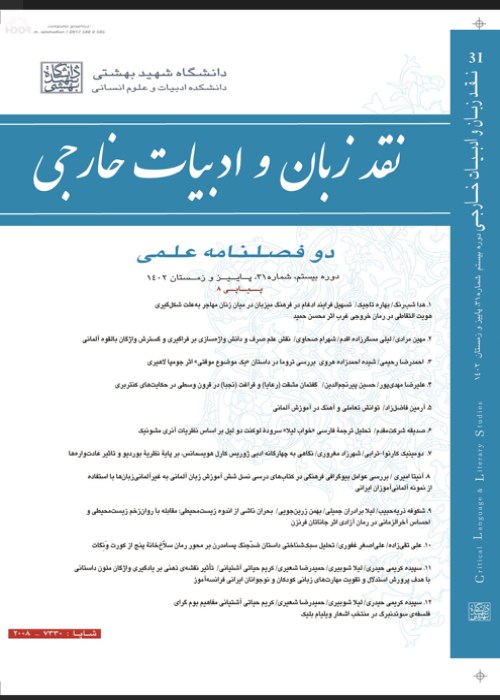The Reflection of Ideological and Anti-ideological Discourses in V.S. Naipaul’s A Bend in the River
Author(s):
Article Type:
Research/Original Article (دارای رتبه معتبر)
Abstract:
IntroductionThe key terms “hegemony” and “counter-hegemony” were first suggested by Antonio Gramsci to describe the soft power in the hands of the ruling system. In Gramsci’s definition, hegemony is related to those discourses in which the ruling system’s values are included and attempted to gain the consent of people in a soft way. In contrast, counter-hegemony means those opposing discourses that stand against the hegemonic discourses and expresses the ideals of the people outside power. While Naipaul’s A Bend in the River reflects the dominant hegemony in colonial and postcolonial era, it is at the same time concerned with exposing the ruling values and producing counter-hegemony. Background of the StudyAlthusser was in search of the ideologies that help Capitalism live through human souls, and be dominant and omniscient in the citizens of his hometown. With the benefit of the constructive system of thought of Claude Lévi-Strauss and Jacques Lacan psychoanalysis and their combination with the traditional Marxism, Althusser was demanding an analysis of different ideologies that elegantly has framed the thoughts and ideologies of a society has satisfied them, and at the same time they are reproducing themselves in the same system. Althusser always had two main questions in his mind, which has framed his Marxist thoughts: first, how a society with reproducing its connections and relationships reproduces itself, and becomes stable through the passing of time; second, what makes the society ready for a social revolution.Methodology Althusser mentions two major mechanisms for insuring that people within a state behave according to the rules of that state: Ideological State Apparatuses (ISA) and Repressive State Apparatuses (RSA). ISAs are institutions which generate ideologies that individuals (and groups) then internalize, and act in accordance with. These ISAs include schools, religions, the family, legal systems, politics, arts, sports – organizations that generate systems of ideas and values, which we as individuals believe. Another is what Althusser calls the RSAs that can enforce behavior directly, such as the police and the criminal justice system. Although the ISAs appear to be quite disparate, they are unified by subscribing to a common ideology in the service of the ruling class; indeed, the ruling class must maintain a degree of control over the ISAs in order to ensure the stability of the RSAs.ConclusionThe main focus of the selected novel is confined to the reign of the "Big Man" and most of his methods for institutionalizing his ideological system by the help of ISAs. He is well aware that using force and violence alone cannot be done, so he resorted to indirect ideological methods to gain legitimacy and gain public satisfaction. These include projects such as "nationalism" and "extremism" whereby the property of citizens of the descendants of the Congo is confiscated. The government also launches a special kind of school and university, a quasi-modern educational system based on all-European models to train obedient and westernized young intellectuals who lack the creativity and power of analysis. In all of this, the President does not resort to force and RSA feeds such as prisons, police, army and European mercenary troops, wherever necessary, but secretly uses them as far as necessary. So as not to tarnish his image in the minds of his people. But the mistake that this coup dictator is making is that he cannot reproduce his ideology and address its weaknesses according to the needs of society, a principle which Althusser emphasizes. As a result, this method loses its effectiveness over time, and the revolutionary forces of the Liberation Army with their anti-modern ideology destroy all the gains of the former regime.
Keywords:
Language:
Persian
Published:
Critical Language & Literary Studies, Volume:19 Issue: 28, 2022
Pages:
199 to 218
magiran.com/p2480803
دانلود و مطالعه متن این مقاله با یکی از روشهای زیر امکان پذیر است:
اشتراک شخصی
با عضویت و پرداخت آنلاین حق اشتراک یکساله به مبلغ 1,390,000ريال میتوانید 70 عنوان مطلب دانلود کنید!
اشتراک سازمانی
به کتابخانه دانشگاه یا محل کار خود پیشنهاد کنید تا اشتراک سازمانی این پایگاه را برای دسترسی نامحدود همه کاربران به متن مطالب تهیه نمایند!
توجه!
- حق عضویت دریافتی صرف حمایت از نشریات عضو و نگهداری، تکمیل و توسعه مگیران میشود.
- پرداخت حق اشتراک و دانلود مقالات اجازه بازنشر آن در سایر رسانههای چاپی و دیجیتال را به کاربر نمیدهد.
In order to view content subscription is required
Personal subscription
Subscribe magiran.com for 70 € euros via PayPal and download 70 articles during a year.
Organization subscription
Please contact us to subscribe your university or library for unlimited access!


